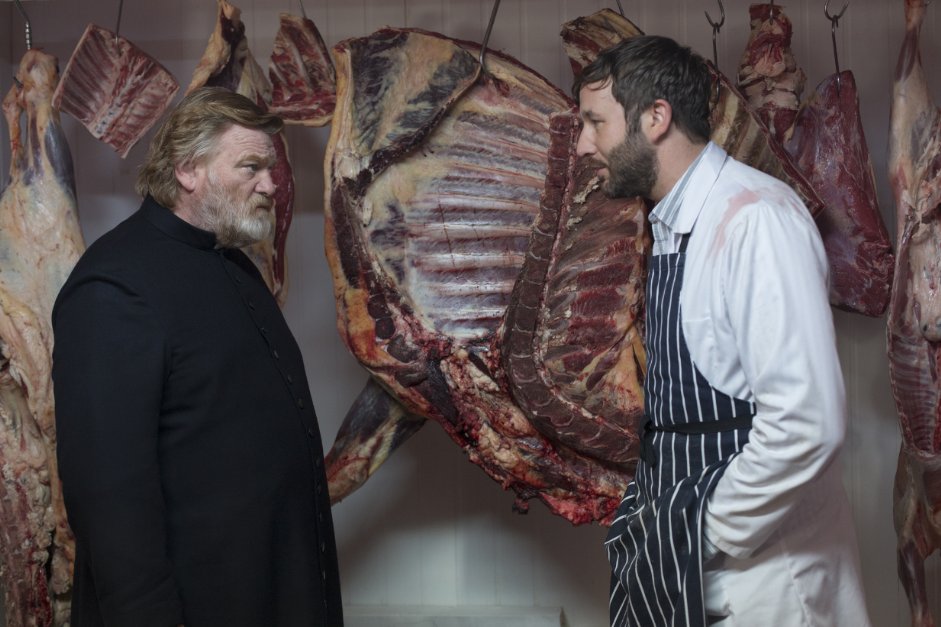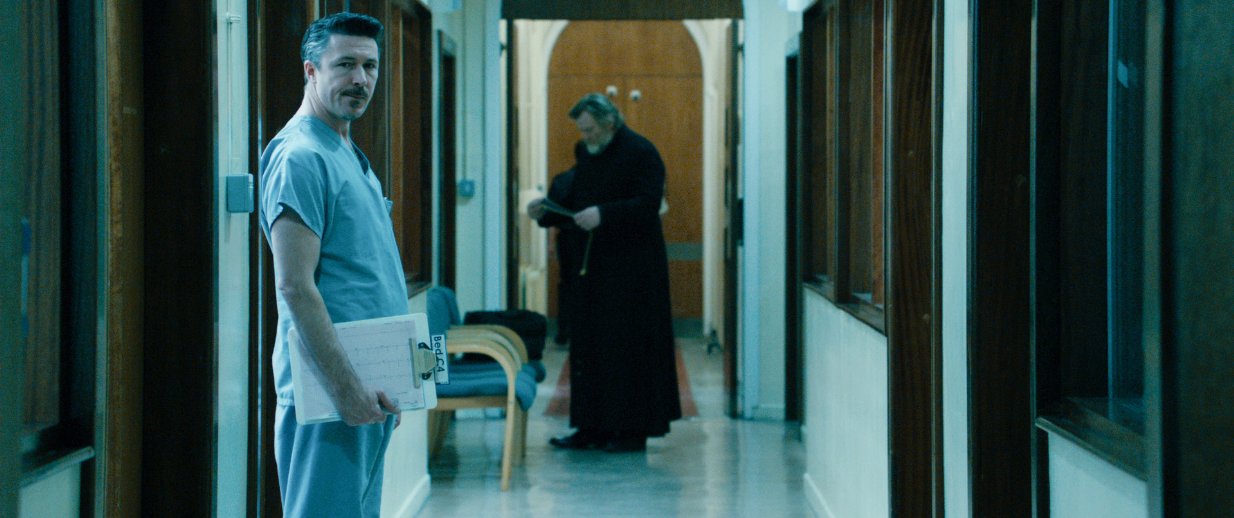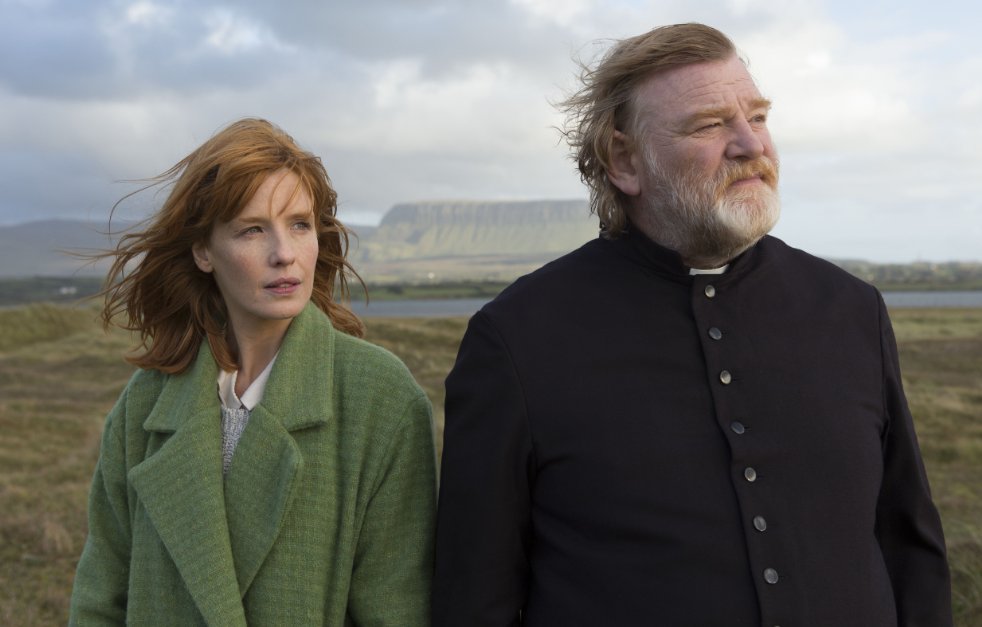Calvary begins with Father James Lavelle (Brendan Gleeson) in a confessional. The man on the other side, rather than confessing his own sins, tells Father Lavelle that he will murder him shortly to make a statement to the world.
 Fox Searchlight Pictures
Fox Searchlight PicturesFather Lavelle has done nothing to him, but the unseen man was raped by a different priest when he was only seven years old. Killing a bad man would not prompt the shock and outrage he wishes to elicit from the world of witnesses. It might not even get noticed outside of their small, Irish town. He wants to kill a good man, and Father Lavelle is the best he can find.
After telling the priest the day and hour of his reckoning, the man asks if Father Lavelle has anything to say to him. Not right now, the father replies quietly, but he hopes to think of something before Sunday next.
It is a superb opening scene, akin to writer/director John Michael McDonagh calling his shot and announcing he is swinging for the fences. Very few people who love movies will be able to watch it without getting that familiar tingle of excitement that alerts you that you may be about to see something great. But then . . .
The film doesn't flounder or fail exactly, but neither does it live up to the promise of its first scene. Brendan Gleeson is terrific and believable as a man who is put in a situation where God (or the impersonal universe, depending on your point of view) asks him to be too good to be true. Father Lavelle confides in a superior and says he believes he knows who made the threat, but he does not reveal who it is. (It's not officially a confession—the man never asked for forgiveness—so there is no seal of privacy over it.)
What follows is a week in the life of the priest as he visits and interacts with various members of the community. There's a doctor (Aidan Gillen from Game of Thrones) who uses his medical knowledge to mock and taunt the priest with tales of unimaginable suffering visited upon seemingly innocent patients. There's domestic violence afoot amongst the town folk, and a rich art collector who tries to shock the priest by urinating on an expensive painting. Then there's a convicted serial killer who Lavelle visits in prison. He claims that the best part of a murder is the moment you see death in a potential victim's eyes and "you become God." In perhaps the film's best line, Lavelle replies simply, "No, you don't."
 Fox Searchlight Pictures
Fox Searchlight PicturesAs if the Job-like priest doesn't have enough to worry about, his daughter—Lavelle is a widower who entered the priesthood later in life—wants him to come up with a reason why someone contemplating suicide (who might that be?) should stay among the living.
Any one of these middle scenes would probably be the crown jewel of another film, leaving Christians overjoyed that someone, somewhere finally had a serious religious conversation in a commercial, narrative film. Played back to back, though, they push Calvary to the edge of plausibility and flirt with becoming self-parody. The content is of the highest moral seriousness, but the whodunit (or who-will-do-it) structure is so deeply associated in our imaginative muscle-memory with Perry Mason and Murder, She Wrote that much of that content's power is lost. Lavelle seems human to us, but everyone else is a caricature, existing only to be a suspect or a temptation.
The weaker middle section would probably fade if the finale were more carefully constructed. It's hard, even with a film titled Calvary, to talk about the end without plot spoilers, so I will simply say that the ending's attempt to indict the morally indifferent ends up complicating Lavelle's status as innocent scapegoat. The film also stylizes the climactic scene in ways no other scene is shot, repeating one act in slow motion like a sporting highlight or pale Tarantino imitation. (For the record, I have liked and esteemed several Tarantino films, but they are so over-the-top throughout that moments of self-aware bombast don't ruin the overall effect; while not devoid of moral seriousness, these films don't have enough of it to be undermined by their moments of self-parody.)
I will be the first to admit that Calvary stands taller than the films that surround it. Is it a better film than Lucy, Hercules, Tammy, 22 Jump Street, How to Train Your Dragon 2, Edge of Tomorrow, Maleficent, Godzilla, and The Amazing Spider-Man 2? Of course it is.
But can we mostly agree that such comparisons are a pretty low bar? The film asks, begs, and practically stomps its foot and demands to be compared to the works of Dostoevsky, Flannery O'Connor, and Robert Bresson. As fellow critic Victor Morton pointed out when the film played at Sundance, you can't have a character quote George Bernanos and then pretend you are not asking to be put in the same category as Diary of a Country Priest.
 Fox Searchlight Pictures
Fox Searchlight PicturesBut the writer that McDonagh ultimately most reminds me of is Graham Greene. That's no insult. The Power and the Glory and The Tenth Men are respectable horror tales of men trying to do right while trapped in impossible situations. And it is to their—and Calvary's—credit that they admit people of faith sometimes do walk the walk as well as talk and talk.
That admission alone earns the film a pass for the cacophony of bleeping language and blood splatter. It just doesn't earn it the right to be spoken of in the same breath as Crime and Punishment.
Caveat Spectator
Calvary is rated R, primarily for one explicit and gruesome act of violence. A man in a confessional describes being raped using explicit language, and there are maybe two dozen or so uses of obscene or profane language. (Somehow when these words are said with an Irish brogue they don't seem quite so egregious. I wonder if people with other accents feel the same way about hearing Americans cussing?) There is some damage against property and cruelty to an animal. Father Lavelle briefly notices someone snorting cocaine.
Kenneth R. Morefield is an Associate Professor of English at Campbell University. He is the editor of Faith and Spirituality in Masters of World Cinema, Volumes I & II, and the founder of 1More Film Blog.











